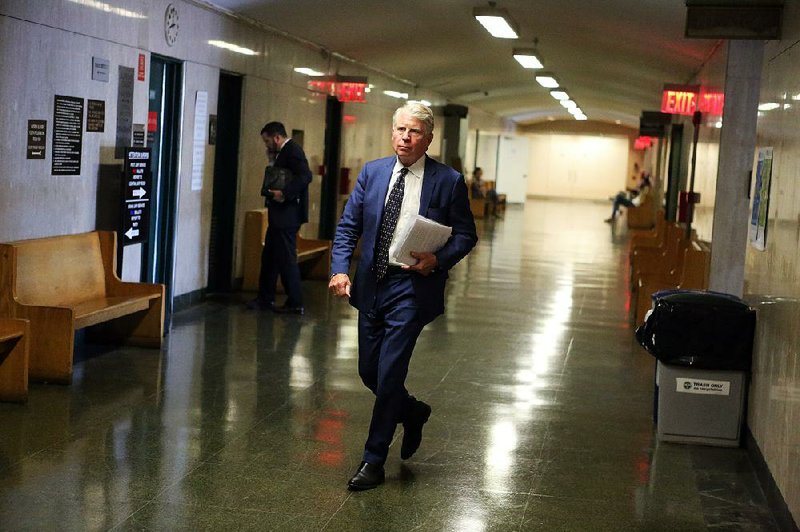President Donald Trump filed a federal lawsuit against New York's Manhattan district attorney Thursday seeking to stop him from subpoenaing Trump's tax returns in an investigation of hush-money payments during the 2016 election, Trump's attorney said.
In the suit, Trump argues that District Attorney Cyrus Vance is conducting a criminal investigation of him, which he contends is not allowed under the Constitution.
That's because the Constitution prohibits any prosecutor from investigating any sitting president for any criminal wrongdoing, he says.
If that were permitted, Trump says, it could give local authorities too much power to hamstring a president's actions. "All you need is one prosecutor, one trial judge, the barest amount of probable cause, and a supportive local constituency, and you can shut down a presidency," Trump's complaint says, quoting law professor Jed Shugerman, according to a copy of the lawsuit posted online by CNN.
Instead, Trump argued, the power to investigate presidents was invested in Congress, which has the power to impeach and remove presidents for "high crimes and misdemeanors."
His suit also quoted an article by Supreme Court Justice Brett Kavanaugh -- written in 2009, when Kavanaugh was an appeals court judge -- saying that "a president who is concerned about an ongoing criminal investigation is almost inevitably going to do a worse job as president."
On Thursday, District Judge Victor Marrero ordered a hearing on the lawsuit for Wednesday. Vance agreed to delay enforcement of the subpoena until after that hearing.
The suit is latest in a string of similar lawsuits by Trump seeking to block investigations into his finances by prosecutors and New York authorities.
In this case, Vance subpoenaed Mazars USA, Trump's longtime accounting firm, Trump's attorneys said. He asked for eight years' worth of tax returns for Trump and his businesses, plus a number of other financial documents, according to Trump's complaint.
PAYMENTS TO WOMEN
The investigation appears to focus on payments to two women, Stormy Daniels and Karen McDougal, who both say they had affairs with Trump years ago.
Daniels, an adult-film actress, was paid $130,000 for her silence by Trump's attorney Michael Cohen before the 2016 election. Cohen said that the payments were made at Trump's direction, and that Trump's company reimbursed him. Cohen is now serving a three-year prison sentence after pleading guilty to campaign-finance violations related to the hush-money payments, as well as other offenses.
McDougal was paid $150,000 by American Media Inc., the publisher of the National Enquirer. The company admitted that payment last year and agreed to cooperate with prosecutors.
Trump has said he did not have sex with Daniels or McDougal. Trump, his aides and attorneys have made contradictory statements about the president's knowledge of the payments.
Vance's office has been investigating whether the Trump Organization falsely accounted for the reimbursements as a legal expense. It was unclear if the scope of the subpoena -- including Trump's personal records -- meant that the inquiry had widened.
In New York, filing a false business record can be a felony only if prosecutors can prove that the filing was made to commit or conceal another crime, such as tax violations or bank fraud. Trump's tax returns, if Vance's office obtains them, would be protected by rules governing grand jury secrecy and not become public unless they were used as evidence in a criminal case.
Trump's lawyers have repeatedly denied that Trump committed wrongdoing.
"No campaign violations were engaged in by the president," Jay Sekulow, Trump's personal attorney, said earlier this month.
HARASSMENT ALLEGED
In the lawsuit filed Thursday, Trump said that Vance did not need eight years of his tax returns to examine whether any laws were broken by the 2016 payments. Also in the suit, Trump called Vance's subpoena to Mazars "a bad faith effort to harass the President by obtaining and exposing his private financial information, not a legitimate attempt to enforce New York law."
Sekulow said in a brief statement Thursday that "we have filed a lawsuit this morning in Federal Court on behalf of the President in order to address the significant constitutional issues at stake in this case."
A spokesman for Vance, Danny Frost, said only that "we have received the plaintiff's complaint and will respond as appropriate in court."
Meanwhile, Democratic-led congressional committees also are trying to obtain Trump's tax returns and other records that could provide a window into his finances. Trump and three of his children filed a lawsuit in April seeking to block two House committees from getting records that his longtime lender, Deutsche Bank, has said include tax returns.
And in July, the president sued to block a new New York law that could allow a House committee to obtain his state tax returns.
Both cases are pending.
Also Thursday, a federal judge in Sacramento issued a temporary injunction against a law that would bar presidential candidates from appearing on California's 2020 primary ballot if they decline to release their tax returns. In July, shortly after the measure was signed into law by California Gov. Gavin Newsom, a Democrat, Trump and the Republican National Committee filed lawsuits challenging it, arguing that California was attempting to "circumvent the U.S. Constitution."
Sekulow said in a statement that the president's legal team was "encouraged" by U.S. District Judge Morrison England Jr.'s decision and looked forward to the formal ruling." It remains our position that the law is unconstitutional because states are not permitted to add additional requirements for candidates for president, and that the law violates the Constitution," Sekulow said.
Information for this article was contributed by David A. Fahrenthold of The Washington Post; by Jim Mustian, Eric Tucker and Kathleen Ronayne of The Associated Press; and by Michael Gold of The New York Times.
A Section on 09/20/2019

